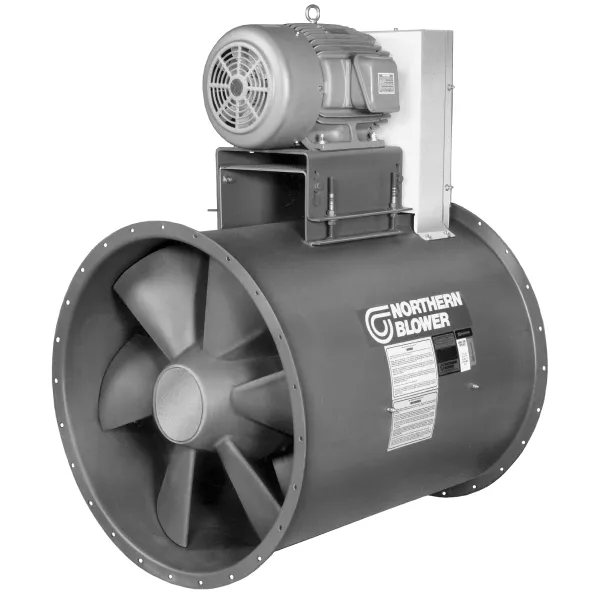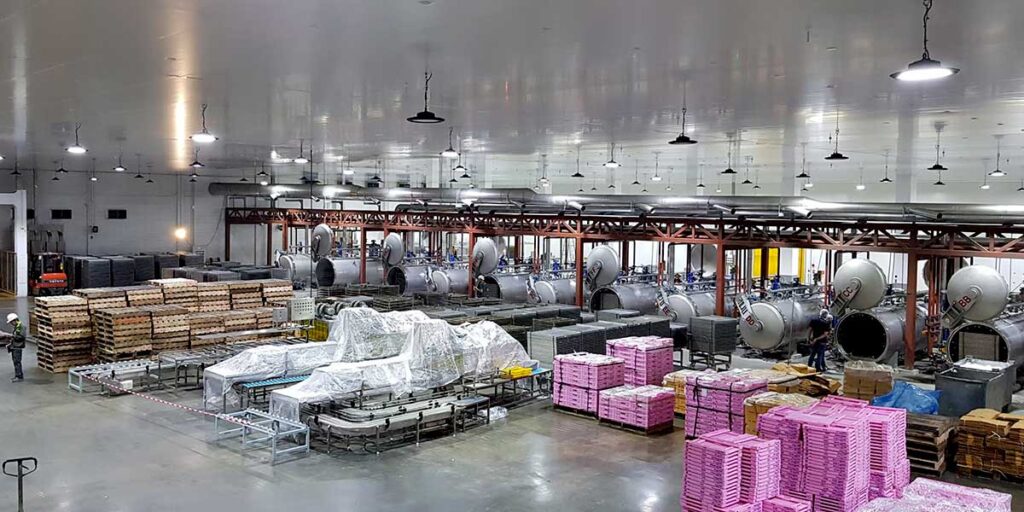The Food & Beverage industry requires strict air quality control to ensure product safety, prevent contamination, and comply with health regulations. Industrial fans play a crucial role in air filtration, cooling, ventilation, and odor control across different stages of food and beverage processing. Below are key applications of industrial fans in this sector:
1. Air Filtration in Food Processing Plants
Food manufacturing environments must maintain clean air to prevent contamination from dust, bacteria, mold spores, and airborne particles.
-
HEPA and ULPA-filtered industrial fans remove 99.97% of airborne contaminants, ensuring a sterile environment.
-
Positive pressure ventilation systems prevent unfiltered outside air from entering food processing areas.
-
Exhaust fans remove fine flour, sugar, and spice dust, reducing cross-contamination and maintaining product integrity.
2. Cooling and Ventilation in Food Production Facilities
Many food processing plants involve heat-intensive operations, such as baking, frying, roasting, and pasteurization. High temperatures can affect product quality and worker safety.
-
High-powered exhaust fans remove heat and moisture from ovens, fryers, and cooking equipment.
-
Industrial cooling fans provide air circulation to maintain stable temperatures in packaging and storage areas.
-
Humidity control fans prevent excessive moisture buildup, reducing the risk of mold growth and spoilage.
3. Air Quality Control in Dairy and Beverage Processing
Dairy and beverage production involves fermentation, pasteurization, and bottling processes, which require strict air purity.
-
Filtered air supply fans prevent yeast, bacteria, and airborne contaminants from affecting dairy products.
-
Ventilation fans maintain constant air exchange in milk processing plants, ensuring hygiene compliance.
-
Activated carbon filtration fans remove strong odors from cheese aging rooms and fermentation facilities.
4. Dust and Particle Control in Dry Food Production
Dry food processing facilities, such as those handling flour, grains, powdered milk, and spices, generate high levels of airborne dust.
-
Industrial dust collection fans remove fine particulates, preventing buildup in machinery and reducing explosion risks.
-
Localized extraction fans ensure worker safety by reducing flour dust inhalation, which can cause respiratory issues.
-
High-efficiency exhaust systems help maintain air purity, minimizing dust cross-contamination in production areas.
5. Odor and Fume Extraction in Meat and Seafood Processing
Processing meat, poultry, and seafood generates strong odors, ammonia fumes, and biological waste.
-
Industrial ventilation fans remove airborne ammonia, hydrogen sulfide, and organic odors from processing areas.
-
Air scrubbers with carbon filtration neutralize strong odors before air is released into the environment.
-
Exhaust fans in rendering plants help eliminate foul smells from meat by-product processing.
6. Cold Storage and Refrigeration Airflow Management
Cold storage warehouses and refrigerated rooms require constant air circulation to maintain even cooling and prevent temperature fluctuations.
-
Evaporator fans distribute cold air evenly, preventing hotspots that could cause spoilage.
-
Humidity control fans prevent condensation, reducing the risk of ice buildup on floors and packaging.
-
Airflow optimization systems help maintain energy efficiency, reducing operational costs.
7. Ventilation in Food Packaging and Bottling Plants
Packaging and bottling facilities must maintain air purity to prevent contamination of sealed products.
-
Cleanroom-grade air filtration fans ensure that packaging areas are free from dust, microbes, and contaminants.
-
High-speed air curtains prevent outside air from entering aseptic filling lines.
-
Exhaust systems remove adhesive and ink fumes from labeling and printing processes.
Conclusion
Industrial fans are essential for air filtration, temperature control, humidity regulation, and odor management in the Food & Beverage industry. By implementing advanced ventilation systems, food manufacturers can ensure compliance with hygiene standards, improve product safety, and create a healthier work environment.

